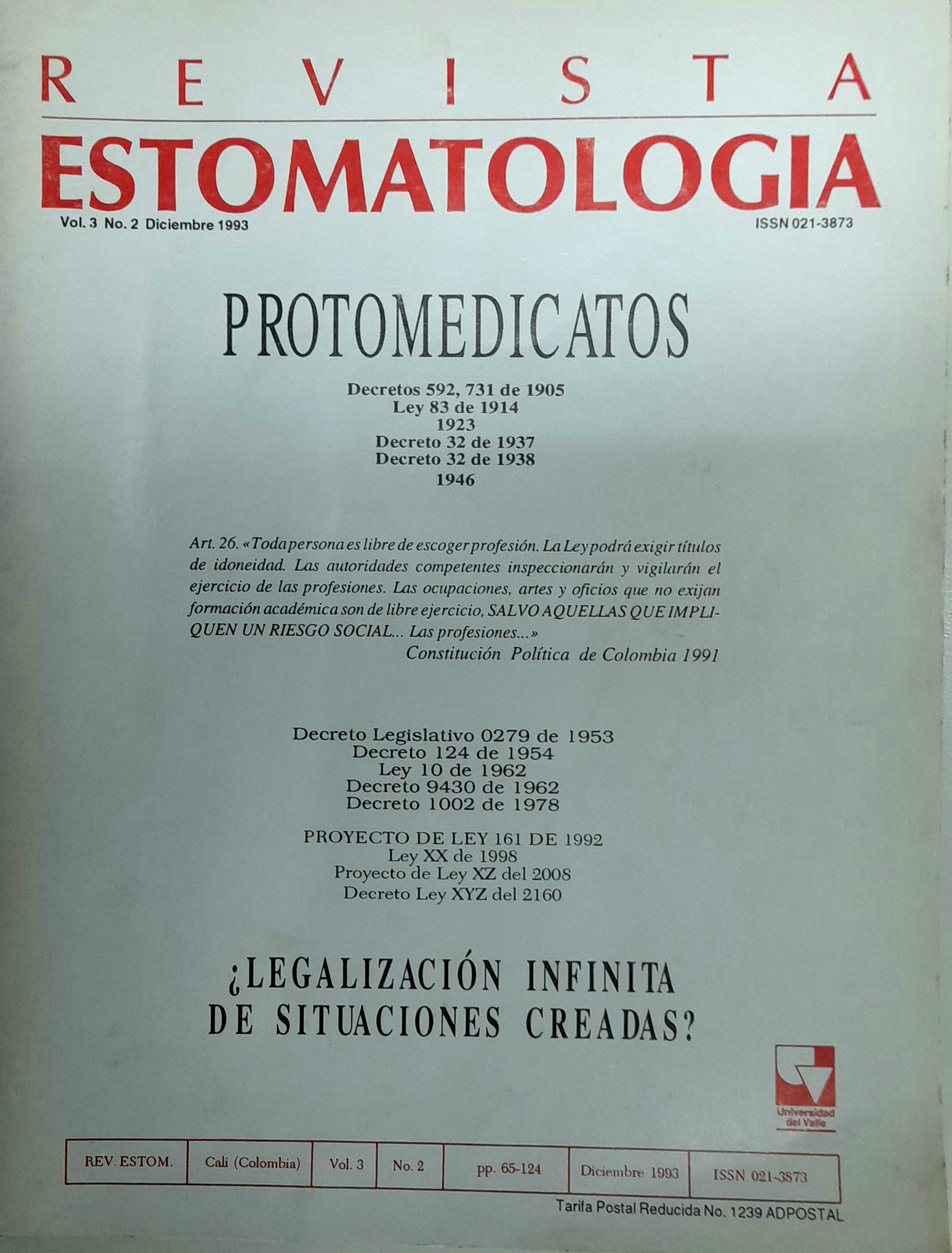Avances en inmunología y respuesta del huésped en enfermedad periodontal
Main Article Content
Understanding the role of the immune system against periodontal bacterial infections may provide the basis for better and more rational strategies for the treatment of periodontitis. In this review the advances in immunobiology are discussed. They offer many aplications in the periodontic area and facilitate understanding of immunopathogenesis of periodontal diseases. The followed topics are discussed: immune cells and their regulatory cell surface molecules, such as the Major Histocompatibility Complex (CMH), cluster of differentation antigens (CD antigens), the effector systems set into motion such as phagocytes and citotoxic cells and the effector molecules such as antibodies, mmplement and citokines, the cell surface receptors as Integrins, Icams, Selectines, CD 44 homing, the mediators including the proteoglycans, the kinins, the anaphylatoxins, the products of araquidonic metabolism such as protaglandins and leumtrienes, the biologically active amines as histamine and serotonine, the innate immunity and the host responses in periodontitis, facuses on studies that show correlation between HLA and neutrophil abnormalities up to recognition that the critical axis is neutrophillantibody/ complement for protection against periodontopatic bacteria. Abnormalities in those systems often lead to increased periodontal susceptibility. The precise role of immune system in periodontitis remains to be elucidated, but recent advances in these areas offer a predictable guide for the treatment of those diseases.
- Jorge-Enrique Soto-Franco, Heberth-Fernando Aldana, Juan-Manuel Navia, Melissa Peláez, Jorge Quisoboni, María-Alexandra O'Meara, Adolfo Contreras, High sensitive- C reactive protein, periodontal parameters and periodontal microbiota after scaling-root planning plus Azithromycin as treatment of Chronic Periodontitis: A Randomized Clinical Trial , Revista Estomatología: Vol. 24 No. 2 (2016)
- Liliana Arbeláez , Sandra Patricia Bravo, Carolina Chica, Adolfo Contreras, Adriana Marcela Ospina, Lina María Rentería, Luis Felipe Uribe, Microbiología de las lesiones apicales crónicas supurativas con fístula , Revista Estomatología: Vol. 11 No. 1 (2003)
- Adolfo Contreras, Pathogenesis of Periodontal Disease , Revista Estomatología: Vol. 2 No. 2 (1992)
- Marietta Celis, Adolfo Contreras, Carmén Elisa Vallejo, La amalgama dental: el material, interacciones con el ambiente oral y contribución a la carga corporal de mercurio , Revista Estomatología: Vol. 3 No. 1 (1993)
- Sandra Amaya, Maria Fernanda Bolaños, Adriana Jaramillo, Jorge Soto, Adolfo Contreras, Periodontal state and subgingival microbiota in preeclamptic women , Revista Estomatología: Vol. 13 No. 2 (2005)
- Adolfo Contreras R., Myriam Astudillo, Luz Helena Daza, Lina Maria García Z., Paola Andrea Gaviria, Beatriz Parra P., Heidy Liliana Rosales, Adriana Jaramiilo E., Contaminación microbiana de los cepillos dentales en pacientes con enfermedad periodontal , Revista Estomatología: Vol. 10 No. 1 (2002)
- Adolfo Contreras, Jorgen Slots, Antibiotic therapy of Periodontal Diseases: A modern context , Revista Estomatología: Vol. 9 No. 1 (2000)
- Jorge Enrique Soto Franco, Beatriz Parra Patiño, Adolfo Contreras Rengifo, Cultivo y caracterización in vitro de una línea celular de fibroblastos gingivales humanos , Revista Estomatología: Vol. 9 No. 1 (2000)
- Mónica Escudero, Javier Enrique Botero, Adolfo Contreras, Microbiología subgingival en pacientes HIV+ con y sin terapia anti-retroviral , Revista Estomatología: Vol. 11 No. 1 (2003)
- , , Editorial , Revista Estomatología: Vol. 14 No. 2 (2006)

This work is licensed under a Creative Commons Attribution-NonCommercial-NoDerivatives 4.0 International License.
Los autores/as conservan los derechos de autor y ceden a la revista el derecho de la primera publicación, con el trabajo registrado con la licencia de atribución de Creative Commons, que permite a terceros utilizar lo publicado siempre que mencionen la autoría del trabajo y a la primera publicación en esta revista.





